Relational Aggression AKA Girl Drama AKA Bullying
School is back in session, which can mean more opportunities to make friends and connect with other young people; bonding over shared experiences and making memories. But it can also mean navigating difficult relationships with peers, including bullying and other types of aggression. While anyone can experience bullying, it can appear more covert amongst girls. Identifying it and knowing how to fix it can be tricky, but to give you a start, check out some of these ideas below:
What does it look like?
Gossip
Not allowing someone to join or leave the friend group
Refusing to share friends
Forcing friends to pick sides in disagreements
Social exclusion
Spreading a rumor behind someone’s back
Silent treatment
Withholding friendship
Threats to end a relationship if that person doesn’t comply
Sabotaging someone else’s relationship
Using negative body language, mimicking, teasing, or put downs followed by “just kidding”
Cyberbullying
Gas lighting
Name calling
Invalidating or ignoring boundaries
Asking parents for support. They can help by:
Listening, affirming and validating your feelings. Just knowing that you aren't the only one who's been unincluded is valuable. And to know you don't have to navigate it alone - priceless. Listening and affirming is a tremendous first step.
Asking questions to understand your perspective, your concerns, and what you’ve already tried.
Assessing your safety at school, online, and anywhere you may be experiencing aggression.
Offering to help you develop an appropriate plan of action. They can follow your lead in what feels comfortable for you.
Focusing on the future, not on what you “should” have done; getting your input as to what you feel will work best, and how/if you would like help from them or other adult allies.
Other ideas:
After-school drop-in at OP is a safe space for girl-identified youth to relax, hang out with other youth, and chat with adult allies.
Therapy services at OP include individual therapy, as well as group therapy options. Learn more!
Parent education trainings help adults learn more in-depth about how they can help.



